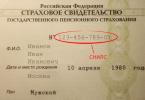The migration policy of the state consists of permits and prohibitions that regulate the flow of visitors and those leaving Russia. The protection of public order, the rule of law and the interests of citizens and the state sometimes require restrictions on foreigners. In the context of migration, we are talking primarily about such a mechanism as a ban on the entry of a foreign citizen into the territory of Russia.
Such a measure is based, as a rule, on previous visits by a foreigner to Russia. If a person has been fined or held accountable, has violated migration rules and regulations, the FMS authorities may apply a ban on entry into Russia for a certain period of time.
 Grounds for imposing a ban
Grounds for imposing a ban
There is a rather extensive list of reasons why a ban on visiting the Russian Federation is established for a foreign citizen. One of the most common is connected precisely with the violation of the migration legislation of Russia. Also, a frequent reason is the application in the past to a foreigner or a stateless person of forced expulsion from the country - deportation. Among other reasons:
- violation of sanitary standards;
- offenses in the customs sphere;
- unpaid mandatory payments (taxes, fines);
- non-payment of a loan, utility bills;
- submission of false data about yourself when traveling to the territory of Russia;
- recognition of the stay of a foreign citizen in Russia as undesirable;
- committing two or more offenses during the last stay in the Russian Federation.
If a foreigner is aware that during the last trip the migration rules were overdue, the period of stay was overdue, any other rules of movement across the border and across the territory of Russia were violated, the probability of imposing a ban on entry is almost 100%.
Restrictive measures can be imposed on foreigners by such state bodies as the Federal Migration Service, the Federal Security Service, Rospotrebnadzor, the police and other public services. At the same time, the general list of persons regarding whom the competent authorities have made restrictive decisions is formed by the Federal Migration Service of the Russian Federation. According to the specifics of its competence, it is this body that controls the entry and exit of migrants, draws up documents for crossing the Russian border, issues a patent for work and performs other functions in the field of control of migration processes.
Checking for a ban
When imposing a ban on entry to foreigners, the FMS bodies enter information about them into a single database. It is through it that entry and exit from the country is carried out. It is extremely inconvenient to find out about the presence of entry restrictions in relation to yourself right at the border. In such cases, no one compensates for the cost of the trip.
That is why it is recommended to check the availability of your name in the even at the planning stage of the trip. Perhaps this will be a chance not only to find out, but also in a timely manner if there are grounds. Moreover, the verification is quick, simple and remote.
The Federal Migration Service, which forms this "black list", provides access to it on its official website. Here you can also find many other useful services for foreigners (patent verification, invitations, work licenses, and others).
The check is carried out as follows:
- go to the FMS website - http://services.fms.gov.ru/info-service.htm?sid=3000 or follow the link -;

- select the "Services" tab;

- in the window that opens, fill out a small form.

In the form, you must specify your personal data, as well as the details of the document by which entry and exit from the country is carried out.
After entering the data in the form, click the "Submit Request" button. The database check takes a few seconds. After that, the system will show information about the presence of the foreigner's name in the "black list" of the FMS of the Russian Federation.
The information that online verification allows you to get does not have legal consequences. To receive an official response, you must send a written request to the relevant Federal Migration Service, which made the decision to impose a ban. However, a quick online check provides useful information on where to apply to lift the ban.
Remove the ban
If there are grounds, the ban can be lifted. This happens when there is an error in the data of the Federal Migration Service, when the period of restrictions expires, in the absence of circumstances due to which sanctions were imposed that restrict entry and exit. There are two ways to get permission to enter:
- administrative;
- judicial.
The first is applied in cases where the measure was applied erroneously or if there are violations in the actions of the FMS employees who made the relevant decisions. Appeals are made to the higher authority.
It is worth applying to the court to cancel the decisions of state bodies if the circumstances under which the sanction was imposed have disappeared.
For some countries whose citizens were massively blacklisted, such as Kyrgyzstan, the situation changes when they join the EAEU. Simplification of migration rules in this case leads to a simpler procedure through which permission is obtained. It is easier to get the right to work (in the form of a patent), study and go on a visit.
In order to remove a foreigner from the "black list" in such cases, it is sufficient to have documents confirming the possibility of legal stay.




